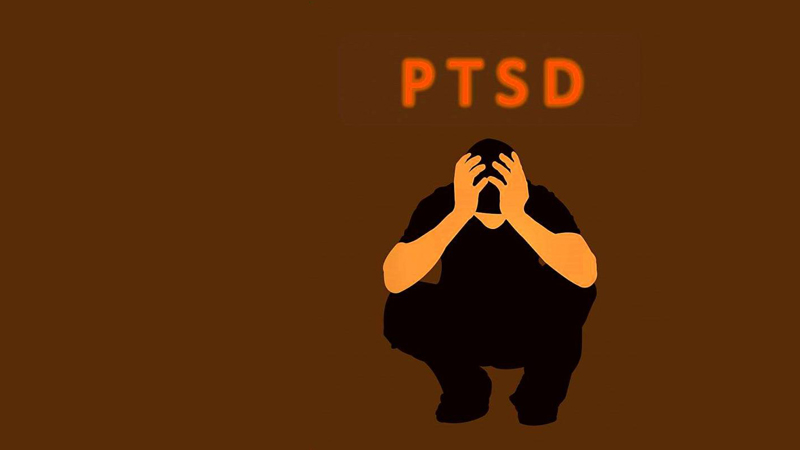Posttraumatic Stress Disorder and Mental Illness

I like the topic of the post--although I do not like living with posttraumatic stress disorder (PTSD). It's something I have not written about in previous posts, so let's talk about it.
Posttraumatic Stress Disorder Symptoms
HealthyPlace has a great description of the symptoms of PTSD that define this anxiety disorder. I'll quote them, in part, below.
Intrusive Symptoms
"Often people suffering from PTSD have an episode where the traumatic event "intrudes" into their current life...the trauma is re-experienced...At times, the re-experience comes as a sudden, painful onslaught of emotions that seem to have no cause. These emotions are often of grief that brings tears, fear or anger."
Symptoms of Avoidance
"This affects the person's relationships with others, because he or she often avoids close emotional ties with family, colleagues and friends. The person feels numb, has diminished emotions and can complete only routine, mechanical activities...Often, they are incapable of mustering the necessary energy to respond appropriately to their environment: people who suffer post-traumatic stress disorder frequently say they can't feel emotions."
Hyperarousal
"PTSD can cause those who suffer with it to act as if they are threatened by the trauma that caused their illness. People with PTSD may become irritable. They may have trouble concentrating or remembering current information, and may develop insomnia..."
To summarize: The symptoms are numerous and specific to the person. For the purposes of this post let's focus on PTSD resulting from the trauma associated with mental illness.
Posttraumatic Stress and Mental Illness
Example: Sometimes, late at night or when the street is quiet and I am walking my dog, when I feel relatively peaceful, my mind assaults me. I suddenly remember being twelve-years old and in the hospital. I remember the concrete rooms, the "safe rooms," I was put in when I was a danger to myself and to others.
These memories feel so real that I feel like that little girl again; I feel the pain and the fear. I try very hard to disassociate from that little girl. The little girl that was me.
I remember the addiction that nearly killed me. I drive through a part of town where I picked up drugs and my heart races. I feel the need to leave. I am terrified.
How Do We Recover From Posttraumatic Stress?
 First, I think it's important to identify the triggers, the thoughts that spur anxiety and fear, the thoughts we try to push away. The experiences we would rather have not happened. Not at all.
First, I think it's important to identify the triggers, the thoughts that spur anxiety and fear, the thoughts we try to push away. The experiences we would rather have not happened. Not at all.
In my life, I have worked really hard to accept that, yes, that was me. How can I move past this? I don't think there is a secret to success (if there is please share with our readers unless, of course, you would charge for this immaculate knowledge) but here's some tools:
>Acceptance. I talk about acceptance a lot in these blogs because I believe acceptance is one of the largest hurdles when recovering from mental illness. This applies to PTSD. Work to accept that scary things happened when you were sick but you are not the same person anymore. You cannot hide from the past, the memories that define it, forever.
>Get help. I hate that term but at the moment my mind is lacking in creativity and I cannot conjure something better. Or maybe this topic is close to my heart and it is hard to write about it. Often, in the case of PTSD, you need to reach out. Having someone, often a counselor and your family and friends, can help you work through the memories and can make the process easier.
>Become involved in society again. When you live with PTSD you often isolate yourself. Isolation lends itself to depression and depression can cause a mental health relapse. Find something you like doing, a hobby (yes, a hobby!), preferably not involving nicotine, drugs or alcohol.
There is masses of literature on the topic and just as much advice. I only have so many words and I'm certain this is a long blog. Here is to hoping you have made it to the end.
In summary: Hang in there. Mental illness itself can create frightening memories, but we can move past them, with a little help and acceptance.
APA Reference
Jeanne, N.
(2012, June 18). Posttraumatic Stress Disorder and Mental Illness, HealthyPlace. Retrieved
on 2026, March 5 from https://www.healthyplace.com/blogs/recoveringfrommentalillness/2012/06/post-traumatic-stress-disorder-and-mental-illness
Author: Natalie Jeanne Champagne
Years ago, you could go to a counselor and then see a psychiatrist if you wanted to. Now, I can't find a psychologist who will take me unless I take meds too. I have not had success with meds. The side effects have been more devastating than the illness. A primary care doctor says I have PTSD from the effects of psychiatric meds alone. Now, I can't go to a counselor because I feel hysterical when it comes to taking antidepressants. I can't get myself to do it so I sit in my house alone. Have no one to talk to about my traumatic experience involving rape. Psychiatry is a big money-making racket and the patients are pawns.